"Horsemen! ... Four Horsemen of the Apocalypse! They have already mounted their horses, have already begun their insane, unrelenting ride. Blind forces of evil, freed from their chains, were to freely roam the world. The martyrdom of mankind began under the savage cavalry of four enemies ... [People] They fled, not knowing where, chased by fire and iron, maddened with terror, as the peoples of the Middle Ages fled from the hordes of Huns and Mongols [...] "- wrote Blasco Ibáñez in 1916. He already knew what the war was like, which others had predicted before him very precisely.
The march of German troops through Belgium in August 1914 left traces from which Europe - despite so many wars in its history - has already recovered. People were murdered, plundered and their lives were destroyed. The unexpected resistance of the Belgians only enraged Kaiser troops, which were outdoing each other in acts of barbarism.
In the towns and villages of the first victims of the Schlieffen Plan, a truly apocalyptic tragedy of world conflict began, against which many observers, writers and statesmen had warned. They saw that Europe and the world were really headed for a cataclysm. The maddening arms race, aggressive imperialism, nationalism, and the outright Byzantine system of alliances between the great powers have created a real gunpowder keg - and it couldn't end well.
Unfortunately, in their predictions, they were most often, like the mythical Kassandra, doomed to lack faith. The world seemed to be on a downward spiral from which there was no turning back. And the emerging warnings could not change anything anymore, remaining only gloomy visions of the future - which were soon to materialize.
A manifesto not only communist
The gallery of gloomy visionaries is opened by Frederick Engels. This co-author of the Communist Manifesto in 1887 made a terrifyingly accurate prediction of World War I. In the introduction to the book Zur Erinnerung fur die deutschen Mordspatrioten:1806–1807 foresaw the conflict between his homeland and the rest of the world marked by "unimaginable violence" .
He drew attention to the size of the warring parties, writing:"Eight to ten million soldiers will jump at their throats and rob Europe more than a swarm of locusts in the process," and mankind will be plagued by "the ravages of the Thirty Years' War compressed into three to four years."
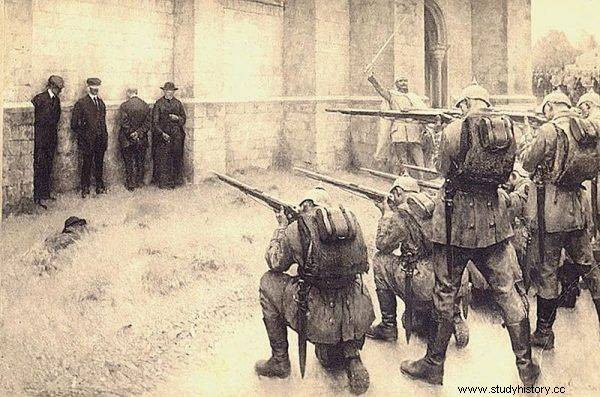
The march of German troops through Belgium in August 1914 left traces from which Europe - despite so many wars in its history - has already recovered.
And although today we know that the armies mobilized during the great war were much larger, the fact of the visionary estimation of forces and the expected duration of the struggle is appreciated. The author also warned that the enormous financial and human costs would lead to the collapse of the current political order in the world, and "the crowns will fall into the gutters by dozens and there will be no one to pick them up".
Of course, Engels would not be himself if he did not mention that the consequence of this peculiar Armageddon would be "to create the conditions for the ultimate victory of the working class." Oh, all he is.
War with Poland in the background
An equally interesting prophet of the great war was the lecturer in military history at the University of Manchester, Col. Frederic Maude - later known as one of the representatives of the so-called invasion literature. He included it in 1892 in his book The Great War of 189-:A forecast a text which is an analysis of Britain's preparation for a possible war and a detailed scenario of its course.
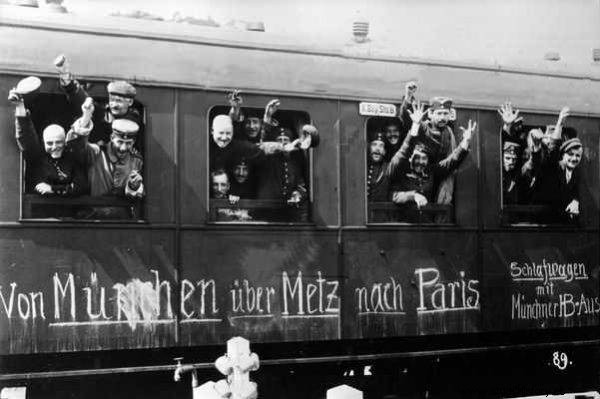
German soldiers going to the front
The plot begins in a village in the Balkans where the attack on a Bulgarian prince by a Russian spy takes place. All European countries are rapidly mobilizing their troops , but after three months of fighting, there is a stalemate as no one can gain a decisive military advantage.
The fights in Polish lands, to which the author devotes a lot of space, add an additional flavor. However, a great curiosity is the description of the proclamation of the governments of Germany and Austria to create the Polish state - after all, it vividly resembles the act of November 5 of 1916! According to Maude, however, the proclamation does not end and one of the consequences of the anticipated war is independent Poland as a buffer state securing Europe against the expected Russian invasion.
Is war impossible now?
The predictions of the Warsaw financier Jan Gottlieb Bloch were extremely accurate. Fascinated by the rapid victory of Prussia over France in 1871, the Polish futurist created a six-volume work on future conflicts and their economic consequences. Published in 1898 under the rather intriguing title Is War Impossible Now? predicted that more precise rifles, more powerful artillery and machine guns would end mobility on the battlefield and force the armies of the future to remain bloody in the trenches . "A shovel will be just as necessary for a soldier as his rifle ..." he wrote.
On the other hand, in trying to break the deadlock, the warring nations will launch massive, extremely bloody and ultimately futile offensives, with losses reaching millions. At the same time, on the domestic front, governments will be forced to mobilize industry to do more and more war production, ultimately endangering their own economic stability and ushering in an era of grassroots political revolutions.
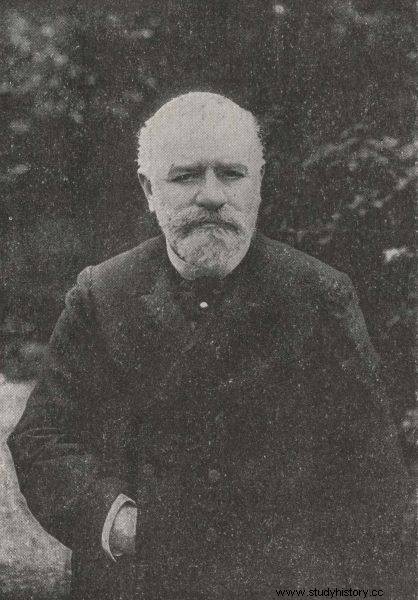
photo:public domain All Bloch's efforts to popularize these warning messages were also ignored
All Bloch's efforts to popularize these warning theses were ignored, despite the fact that Tsar Nicholas II himself became interested in his theories. The commanders of the Entente and Central Powers learned the lessons of the Polish banker only through trial and error. And the Russian and German monarchies proved equally incapable of assimilating Bloch's warnings about the revolution, paying for it with their lives and exile. The author himself remained satisfied with the submission of his work to the Nobel Peace Prize.
Dreams of war
In 1904, the German military and extremely prolific writer (he was the author of about 60 literary works) August Wilhelm Otto Niemann published a novel under the highly meaningful title Der Weltkrieg. Deutche tr ä ume in which he had a vision of the conflict between Germany and Great Britain.
He presented his forecast against the background of the actual maritime arms race between the Kaiserliche Marine and the Royal Navy, which had been going on since the end of the 19th century. At the same time, he emphasized his own enthusiasm for the coming war, in which his country's allies were ... France and Russia. Only this way, according to him, it will be possible to defeat the hated Albion, and as a result of winning Germany will fulfill her dreams of greatness and a new division of the world . How was it then a typical Kaiser search for one's place under the sun ...
Wells's War
Oversized by his more famous work on invaders from Mars, Herbert George Wells' 1908 novel The War in the Air she predicted a conflict between the US and Germany and Japan. In his mind's eye, Wells could see mighty fleets of armed airships battling high above the clouds. At the same time, squadrons of German steam-powered aircraft were conducting bombing raids on Manhattan and other great American cities, and the Japanese air fleet attacked American ships like a WWII kamikaze.
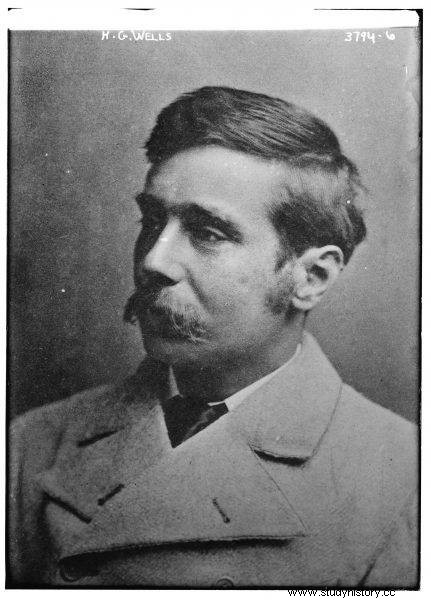
Herbert George Wells novel "The War in the Air" foretold the conflict between the US and Germany and Japan.
Published a few years after the first flight of the Wright brothers' plane, a truly steampunk (a science fiction genre inspired by steam technology) novel deftly capitalized on the growing public concern about the threat of war - technology.
Admittedly, Wells did not quite match his predictions (Germany never attacked New York, although such plans existed), his predictions that cities would be targets for air attacks turned out to be extremely prophetic . As for the problems with Japan, yes, in the great war it sided with the Entente, but then there was the attack on Pearl Harbor ...
Memorandum for reflection
The closer to 1914, the more the world seemed to be alive with the impending cataclysm. However, there were those who still deluded that the catastrophe could be avoided, or at least could be prepared for it. One such person turned out to be the former Minister of Internal Affairs of the Russian government, Piotr Durnovo.
He was known for his opposition to strengthening ties with Great Britain and France at the expense of relations with Germany. He maintained that the alliance of the triple understanding to which Russia belonged would involve it in a completely unnecessary and fatal fight against the mighty Second Reich. He also believed that German and Russian interests are complementary, and that a war between the two empires can only lead to destruction existing political orders.
So, seeing the global conflagration fast approaching, he sent a warning memorandum to Tsar Nicholas II in February. In this super secret document, Durnovo precisely defined the parties to the conflict and what its likely consequences would be. According to him:
The main parties in a future war are obvious:Russia, France and England on one side, with Germany, Austria and Turkey on the other. It is more than likely that other powers will participate in this war as well, depending on the circumstances that may exist at the outbreak of the war.
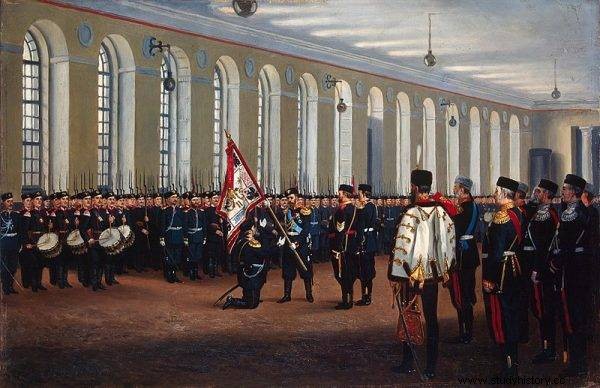
It is not known if Nicholas II ever bothered reading this document. Maybe if he had done it, his history and the history of the world would have been different…
And to confirm these assumptions, he continued:
Italy, if it has any idea of its true interests, will not join the German side. For political and economic reasons, they are undoubtedly counting on expanding their present territory. Such an expansion can only come at the expense of Austria on the one hand and Turkey on the other.
And then it's even more interesting, because here is:
[Romania] will remain neutral until the balance of fortune favors one side or the other [...] Serbia and Montenegro will undoubtedly join the opposing side of Austria, while Bulgaria and Albania […] will stand up against the Serb side. Greece is likely to remain neutral or to take a joint case with the opposing side to Turkey, but only after the issue is more or less settled [...].
He also very aptly referred to the future stance of the US and Japan on the war, stating that they would most likely join the Entente.
In hindsight, these prophecies may seem obvious, but in February 1914 they must have been astonishing. After all, Italy was then officially allied with Germany and Austria-Hungary, Ottoman Turkey opted for neutrality, and the ruler of the Hohenzollern dynasty sat on the Romanian throne [!].
The disturbing visions also concerned Russia itself, whose army, badly prepared and suffering from the lack of an efficient railway network, would be decimated. Moreover, Durnovo warned that "the war will require expenses in excess of Russia's limited financial resources . We will have to get a loan from allied and neutral countries, but it will not be granted free of charge. " All this will lead to the outbreak of a social revolution that will overthrow the current system of government. And regardless of who wins the war, "Russia will plunge into hopeless anarchy ...".
Unfortunately, it is not known if Nicholas II ever bothered to read this document. Maybe if he had done it, his history and the history of the world would have been different…
